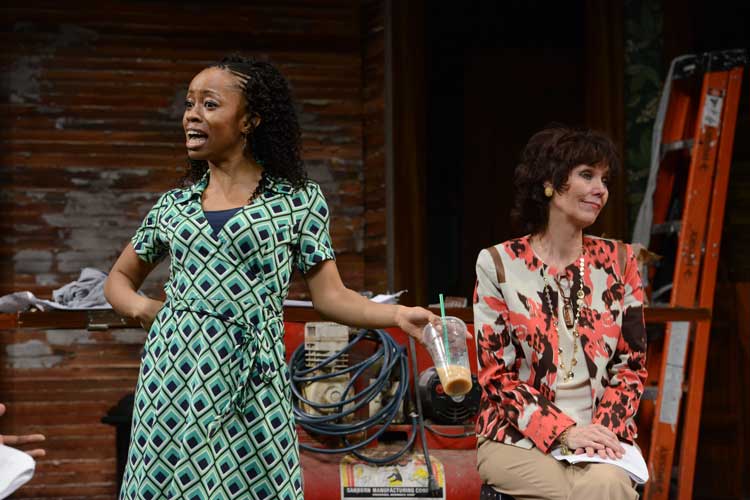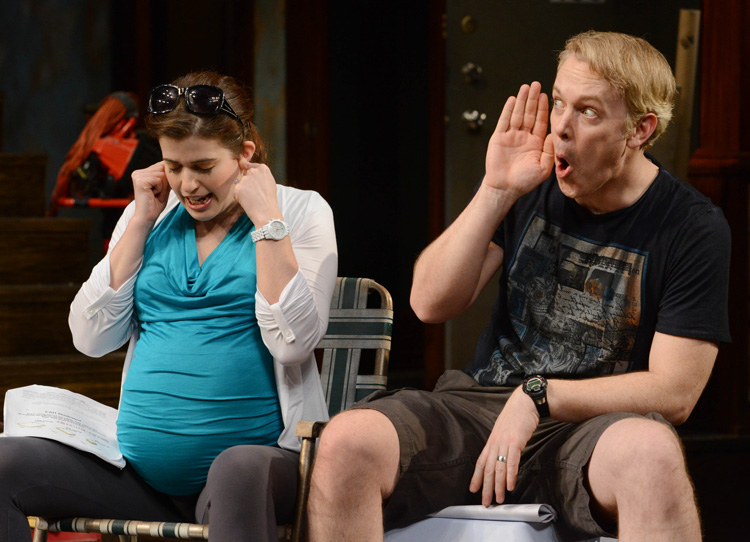Last week I had the opportunity to go see Clybourne Park at Pittsburgh Public Theater and I need to tell you it is a real treat and recommend everyone see this great show. I’m not actually sure how I want to write about it. I don’t know if I want to really give away the story or not. A true value of watching live theater within an audience is that the experience of being exposed to the show as a group is part of what makes it special. Clybourne Park deals with issues surrounding race and community and the ways in which we both understand ourselves to be open to diversity but in reality, may not be.
Set in two acts, each acts tells the story of a couple in the same home fifty years apart. A broader narrative is how discrete events may set in motion larger changes and the the things people do to understand, withstand, or accept those changes.
The most surprising thing for me, were the memoriesraised by the first act. I grew up in an all white neighborhood in the South Hills of Pittsburgh. The only black family I knew, was my grandmother’s housekeeper, Mabel’s family. I was raised to believe that we were very progressive, and open minded, yet years later, I realized this was not quite all it had seemed. The relationship between Bev and Francine reminded me much of my family, although in my case the family secrets and insanity were of a different nature. We were the only white people at Mabel’s daughter’s wedding for example, and we were accepted entirely it seemed. Though I remember one year, my Grandmother hired Mabel’s husband Curtis, to drive us to Atlantic City for an audition. At the time, my Grandmother felt too weak- that two women, she and my mother shouldn’t take the family there and the money she paid him would help their family. Yet there was something weird about it, as if she took pride in having a black driver. It was a family friend helping the family, and yet, it wasn’t that at all. I don’t know that I related to any of the characters directly in this act, but rather the dynamics overall.
If you see the show, don’t leave the theater for the intermission! The set change is worth the price of admission.
The second act was very different in that at times, I found myself identifying with most every character in the act. Was I most like Tom, Lena, Kathy, or Steve? Or all of them? And unlike the first act which could be accepted as, the way things used to be, this act was too much, like it is now, that it was both uncomfortable and familiar. At the core of it, the intersection of Race, Racism, and being Racist were visited from different perspectives. I especially appreciated the role of humor in the story, and the way several jokes are used to highlight and pinpoint ideas about these issues- cutting and harmless or at the very least arming and disarming at the same time. When you see the show, pay attention to what jokes you laugh at what others in the audience laugh at. Think about which were and were not uncomfortable for you.
Less overt perhaps, is the way the play is all about identity: how we self-identify as well as how we identify others. Gender, sex, race, sexual orientation, history, proximity, and legacy all are a part of it, and you may be surprised as to which of these seem the most and least problematic. I believe it is too easy to think that we relate or identify with others based on only a few levels, when in reality it may be others entirely which are what bonds us or act as boundaries.
I would actually say that the play has three acts, for there is a bit at the end, far more closely tied to the first act than the second. It was both beautiful and deeply sad, at least for me. As I started to write this, I considered being critical that it wasn’t a separate act, but the more I have sat with it, I came to love the way the stories are intertwined or entangled. After you see it, please tell me if you think Kenneth is gay? I did, but my partner didn’t at all. What do you think?
After some of the shows, there is a Q/A period with the cast and audience and it is worth staying for this. Unfortunately, the audience has had little time to really process all they have seen, and I think the dialogue would be better after a longer pause, but still it is interesting. The night we saw the show, a question was raised as to if the show suggests hope or hopelessness. What has really changed is asked and the cast seems to feel things have changed and are changing. I don’t think I really agree. In both acts there is a lot of talking, but no one is really listening to each other for various reasons. Except for a few glimpses of real attempts to hear another person- and that is where the hope resides. The cycles and dynamics which are both inevitable and avoidable are modulated and remedied by learning to listen to one another with an inquisitive desire to understand the other’s history.
There are plenty of plays which deal with heavy hitting subject matter, and an audience can often feel as if they have been a nail to the writer or director’s hammer, but this is not the case here. This is a show of many laughs and light moments that are pure pleasure. The humor is not just a tool to make the content more palatable, but rather an authentic and essential element of the truth of the show. I hope you see this and share your thoughts about it as a comment here in my blog.
http://www.ppt.org/pages/bruce-norriss-triple-crown-winner-take-the-stage
Clybourne Park runs until May 19th.

